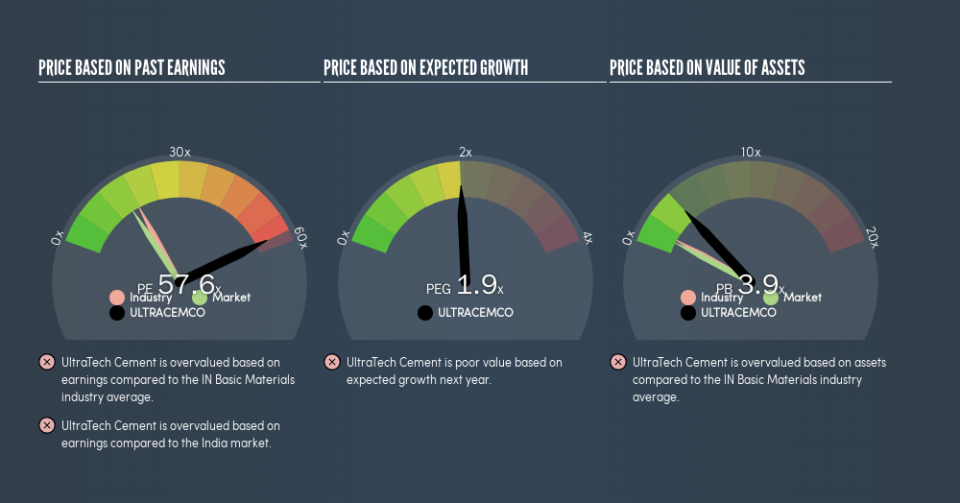Don’t Sell UltraTech Cement Limited (NSE:ULTRACEMCO) Before You Read This

This article is written for those who want to get better at using price to earnings ratios (P/E ratios). To keep it practical, we’ll show how UltraTech Cement Limited’s (NSE:ULTRACEMCO) P/E ratio could help you assess the value on offer. Based on the last twelve months, UltraTech Cement’s P/E ratio is 57.61. That means that at current prices, buyers pay ₹57.61 for every ₹1 in trailing yearly profits.
View our latest analysis for UltraTech Cement
How Do I Calculate UltraTech Cement’s Price To Earnings Ratio?
The formula for price to earnings is:
Price to Earnings Ratio = Share Price ÷ Earnings per Share (EPS)
Or for UltraTech Cement:
P/E of 57.61 = ₹3878.35 ÷ ₹67.32 (Based on the trailing twelve months to December 2018.)
Is A High Price-to-Earnings Ratio Good?
A higher P/E ratio means that buyers have to pay a higher price for each ₹1 the company has earned over the last year. That isn’t necessarily good or bad, but a high P/E implies relatively high expectations of what a company can achieve in the future.
How Growth Rates Impact P/E Ratios
If earnings fall then in the future the ‘E’ will be lower. That means even if the current P/E is low, it will increase over time if the share price stays flat. A higher P/E should indicate the stock is expensive relative to others — and that may encourage shareholders to sell.
UltraTech Cement shrunk earnings per share by 26% over the last year. And it has shrunk its earnings per share by 7.9% per year over the last three years. This growth rate might warrant a low P/E ratio. This growth rate might warrant a low P/E ratio.
How Does UltraTech Cement’s P/E Ratio Compare To Its Peers?
We can get an indication of market expectations by looking at the P/E ratio. As you can see below, UltraTech Cement has a much higher P/E than the average company (17.8) in the basic materials industry.
That means that the market expects UltraTech Cement will outperform other companies in its industry. Shareholders are clearly optimistic, but the future is always uncertain. So investors should delve deeper. I like to check if company insiders have been buying or selling.
Remember: P/E Ratios Don’t Consider The Balance Sheet
It’s important to note that the P/E ratio considers the market capitalization, not the enterprise value. Thus, the metric does not reflect cash or debt held by the company. In theory, a company can lower its future P/E ratio by using cash or debt to invest in growth.
Such expenditure might be good or bad, in the long term, but the point here is that the balance sheet is not reflected by this ratio.
How Does UltraTech Cement’s Debt Impact Its P/E Ratio?
UltraTech Cement has net debt worth 14% of its market capitalization. It would probably deserve a higher P/E ratio if it was net cash, since it would have more options for growth.
The Verdict On UltraTech Cement’s P/E Ratio
UltraTech Cement has a P/E of 57.6. That’s significantly higher than the average in the IN market, which is 15.8. With a bit of debt, but a lack of recent growth, it’s safe to say the market is expecting improved profit performance from the company, in the next few years.
Investors should be looking to buy stocks that the market is wrong about. People often underestimate remarkable growth — so investors can make money when fast growth is not fully appreciated. So this free visual report on analyst forecasts could hold the key to an excellent investment decision.
Of course, you might find a fantastic investment by looking at a few good candidates. So take a peek at this free list of companies with modest (or no) debt, trading on a P/E below 20.
We aim to bring you long-term focused research analysis driven by fundamental data. Note that our analysis may not factor in the latest price-sensitive company announcements or qualitative material.
If you spot an error that warrants correction, please contact the editor at editorial-team@simplywallst.com. This article by Simply Wall St is general in nature. It does not constitute a recommendation to buy or sell any stock, and does not take account of your objectives, or your financial situation. Simply Wall St has no position in the stocks mentioned. Thank you for reading.


